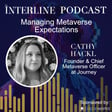Become a Creator today!Start creating today - Share your story with the world!
Start for free
00:00:00
00:00:01

H&M's DPC Journey
Emma speaks to Bhargava Ram Kummamuru, Product Manager leading Digital Product Creation at H&M. Together, they explore where H&M stands on its DPC journey today, the strategic direction that Ram and H&M see DPC taking, as well as how the broader tech ecosystem for fashion is maturing.
Transcript
H&M's Digital Product Creation (DPC) Strategy
00:00:04
Speaker
a
00:00:07
Speaker
At H&M, the entire world of digital product creation from the design tools to development of asset creation like fabrics, trims, avatars all of them to technological development like from asset management to building plugins or automations or whatever, they're all under one space.
00:00:26
Speaker
And I think that was one of the factors that I felt was quite successful. That's something that I feel like i want to i would love to discuss to the world is that that makes you be very optimized as a unit. And also that it makes you kind of work on common projects rather than individual projects.
Introducing Bhargava Ram Kumamuru
00:00:46
Speaker
Hello, everybody. Emma here, your host of the Interline podcast. Today, we're really excited to have Bhargava Ram Kumamuru, product manager heading the digital product creation team at H&M on the show.
00:01:01
Speaker
In this episode, we discuss his definition of DPC and fashion as someone with a computational design background with a passion for technology.
Maturity of Fashion Tech and AI's Role
00:01:09
Speaker
We discuss where H&M is on its DPC journey today and also how he sees the general tech ecosystem for fashion maturing.
00:01:18
Speaker
Alongside this, we also get into a deeper conversation around AI and how it's found its way into almost every corner of fashion We talk about whether the DPC community is looking at AI the right way, and also H&M's ethos and outlook going forward when it comes to technology.
00:01:35
Speaker
It's a really great conversation. Let's get into it now with Ram.
00:01:40
Speaker
A huge welcome to Bhagavad Kumamuru, who is the product manager heading the digital product creation at H&M. Could you please just um start by introducing yourself?
00:01:53
Speaker
And I'd love to know a little bit more about your career and how you ended up in your current
Ram's Transition from Architecture to Fashion
00:02:00
Speaker
role. I know a little bit about you. You've mentioned to me that you started your career as a computational designer in architecture with a passion for technology who landed serendipitously fashion. So I'd love to hear little bit more about your journey.
00:02:15
Speaker
ah yeah. I mean, it was actually like... I like that and the story of the computational design part. It's actually like one of my friends, she told me... She forced me, actually, to go for an architectural lecture.
00:02:29
Speaker
And the architectural lecture was about actually about... This guy called Winnie Maas, he's from Netherlands. I think Winnie Maas is of the very famous architects in the industry. And he actually spoke about the future of 3D, AI, and all this kind of cool stuff. And and back at the time i was doing in engineering, and i was like, holy shit, this is actually pretty cool stuff.
00:02:50
Speaker
And actually ended up dropping out of my master's instantaneously. And I started actually just figuring out how to start my career in design and 3D and AI. And then I stumbled upon an opportunity to to work as a competition designer in architecture.
00:03:04
Speaker
And that's actually how it all started. And from there on, the one of the girls was in the lab, actually. She went for three months internship to Adidas. Actually, her name is Maya, and she's actually presently working at On Running right now.
00:03:17
Speaker
Yeah, and and then she actually ended up like recommending me at Adidas. And then that's how i got into fashion. So in some way, I started enjoying the part of like bringing those technologies together with creative designers and then kind of connecting the dots together, scalability. And that was a journey at Adidas where I learned a lot.
00:03:34
Speaker
And then I got into H&M. And then I was like, okay, actually, you know what Maybe I should go for more leadership roles. ah I kind of like, can I enable a group of talented individuals to do cool stuff ah by being more than the manager role?
00:03:47
Speaker
And I started doing that at H&M. And now, yeah, I'm heading major part of digital product creation, as industry knows, um connected to everything related to 3D design, pattern making, product components like fabric streams, avatar developments.
00:04:00
Speaker
So the end-to-end development of digital product creation, I kind of take over right now.
The Scope of Digital Product Creation
00:04:05
Speaker
That's fantastic. And how do you actually define digital product creation, DPC? So DPC is an acronym that everyone has aligned on, but it's actually a term that has a lot of different definitions, a lot of start points and end points. So in your experience, does DPC look any different in fashion compared to other industries? Yeah.
00:04:28
Speaker
Because as we've just talked about, you've had a different career. i And I'm just interested to know how you define it and how it's maybe changed over time in your experience.
00:04:39
Speaker
I think one from a fashion perspective itself, from the time I've took on the space, I often in every deck of presentation to my management team, I always tell that digital product creation is not three d product creation.
00:04:52
Speaker
I think that has been one of the struggles in the industry that everybody thinks digital product should be 3D. And I'm like, it's not really, it's a digital product. It could be an illustrator sketch or it could be a Photoshop sketch or anything.
00:05:03
Speaker
3D is just one form of representation of a product creation from a digital perspective. And when you look in the industry, it's kind of the same. But the major difference between if you look at automotive, I mean, I always say the story is that every technology kind of starts from VFX, then goes to automotive, then goes to furniture, then goes to fashion.
00:05:22
Speaker
ah like That's how there always any technological ed adaptation has been in the past few decades. ah But the fact is, when you look at the closest relationship that we could have in the digital product creation industry is actually furniture, like IKEA.
00:05:34
Speaker
But every brand is also kind of different. So the way I look at digital product creation is always like, make the best digital representation of physical product that you can actually productize.
00:05:46
Speaker
That for me is the base definition of it. And then additional interest that I have on top of it is try to make it that you can actually increase the lifecycle of the digital asset. So rather than just using it for internal processes, can we go towards like e-commerce, marketing, or also even internal mood boarding and different places. So productization with the combination of increasing lifestyle is usually how I define DPC.
00:06:11
Speaker
Okay. No, that's fantastic. That's a really comprehensive view of it. um And yeah, I agree with that ah sort of timeline that that you mentioned, you know, where fashion kind of is the last point. It's not the least point, but um that does make sort of sense to me how you've defined it there.
Challenges in 3D Adaptation and Standardization
00:06:30
Speaker
And although it's not a straightforward thing to benchmark because every brand's ambitions and targets and resources are different, I want to get a bit into how you would say ah what you do at H&M.
00:06:46
Speaker
Where are you today in the DPC journey? um We can address this at a high level. um You know, what have your major so success successes been and what didn't work out the way you thought it might? And I know this is going to come from your experience. um It can be, you know, touching a bit on your work at H&M, but I kind of want to know about your perspective.
00:07:09
Speaker
ah you know, how this journey has been. And it can even be a broader sort of perspective on where the fashion industry is in terms of DPC. I think ah one of the funny things that I realized after kind of like joining H&M, like in the past, I know it's been like four years in the brand,
00:07:28
Speaker
Whenever I go for any of the events, the one of the major pain points that everybody talks about is adaptation towards 3D and technologies and stuff. And the weirdest sense at H&M, we actually don't have that as a major problem.
00:07:40
Speaker
And in in in in the reason being is also that when the 3D tools were introduced, as even before my time, ah they nobody thought about like, oh, we need to actually onboard i see a specific department or section and then kind of scale it from there.
00:07:54
Speaker
They just gave it to everybody and people started using it and and know everybody started getting adopting into it. So it's like when I came into the brand, it's not like, oh, people are just using 3D and there's no talk about adaptation of a tool.
00:08:06
Speaker
But the con of that approach has also been that is we didn't have standardization. we didn't have the foundations because we went very fast in the world of ah ah three d or digital product creation, I say.
00:08:17
Speaker
But so it for me, the challenge is a whole different ballgame where was like, okay, as the people are using the technology across the brands, including portfolio brands and everywhere, how can I actually accelerate this technological landscape of foundations in order to support the design teams?
00:08:33
Speaker
So my challenge is a completely different ballgame had to figure out at Adidas compared to when I see with other companies who are kind of facing the world of 3D. Okay. Okay. That's quite a curveball, I guess. um Yeah.
00:08:48
Speaker
Well, yeah. Would you say it's been, how was that for you? Would you say it was very challenging or what did you find your feet quite quickly with with all of that? It is a different kind of a challenge. And it also means that when you want to hire people, it's a different type of resource hiring.
00:09:04
Speaker
So I was the first person who joined H&M from a technological background. So then I had to hire a lot more technological people because we are falling behind on tech part. So the challenges that I had to that i had to create are maybe more than challenges. The the opportunities that had to create was different to the situation that I expected to be in.
00:09:23
Speaker
That also means that that's often, and that's why say is that the success of any brand is you need to understand what kind of brand you are and what state you are in. So there's no like a formula that somebody can join a fashion brand and say, I'm going to make DPC happen here.
00:09:36
Speaker
Not really. What I have done at Adidas, it doesn't at all work working at H&M. H&M is also a place where you have your own stores. Adidas and other companies have selling stores. So we don't have the need of selling the 3D or digital product to somebody else. We have to sell it to ou ourselves.
00:09:52
Speaker
So our challenges were different compared to other brands that I worked with. And from there on, we had to figure out what plan actually best fits for H&M as a fashion brand, which is trying to compete with the market ah against the brands that actually makes sense against to work with.
00:10:09
Speaker
Yeah, no, that makes a lot of sense. ah And now we've we've briefly touched on this, but, you know, every company has its own unique points, every company is different. So scaling is also going to be something that is different. So what in your mind are the prerequisites to taking the work you've put into digital so far and then making it an even bigger pillar of the way the company works in general?
00:10:40
Speaker
ah one of One of the things that I learned through my time, and I feel like now at H&M often we talk about it, is ecosystem.
Building an Integrated Digital Fashion Ecosystem
00:10:48
Speaker
ah Often many brands, they try to do individual projects around DPC, like, okay, let's do this footwear project here, or let's do this apparel project here with 3D.
00:10:58
Speaker
Let's do a fabric 3D library. Let's do a print library there. Let's connect this to PLM system and so on. So often at the brand, what we have done, I feel that one of the differentiating factors that we have tried to go for is we created an existing ecosystem like, OK, we need foundational assets.
00:11:15
Speaker
So we need your form foundational assets. This is how we produce them. Who should be producing them? Whether should we produce it in in-house? Should we go with external collaboration? But that's like a strategy for digital asset creation, like fabrics, trims, avatars.
00:11:28
Speaker
And then we were like, OK, where do we need to store them? But we cannot think from three d point of view. We should also think from prints. How do we handle in-house prints, bought prints, license prints? How do we get those digital assets into the experience?
00:11:40
Speaker
So we actually looked at always the ecosystem of saying, and the ecosystem also included what is user-facing and what is not user-facing. So we started with the idea of like, this is the landscape, this is the ecosystem.
00:11:52
Speaker
What technologies, what processes, what methodologies fits into this world that we have accommodate towards? I think that usually is where many companies start failing is when they either split themselves into smaller departments or they end up like doing individual projects to showcase rather than looking at the entire scalability and enterprise level applications.
00:12:14
Speaker
Okay. Yeah, I know that tracks. i I'm wondering now if you can talk a bit about... where you see the general tech ecosystem for fashion
Centralizing Asset Management for Operational Efficiency
00:12:28
Speaker
maturing. So we've spoken a bit about H&M now, but I'm wondering about the other end of that where there are ah elements that brands perhaps have in common ah when it comes to technology ah pipelines.
00:12:45
Speaker
So where do you think brands have things in common and and where would that general tech ecosystem have space to mature? i one one element that I believe the and every brand needs to start focusing, which I surprisingly don't see what a lot of brands in the world yet doing, is actually centralizing asset management.
00:13:09
Speaker
That I feel has always been a central issue across brands that they don't basically get all these assets into a single location. And from there, building the technological layers on top of it.
00:13:21
Speaker
So, When you start actually understanding that you need to look from end to end perspective, that technological landscape there, and you centralize your assets, and then you link your centralized assets with your PLM system, because often also a lot of brands that say that, okay, let's say let's make the PLM system to be your asset management system. That actually doesn't work.
00:13:39
Speaker
ah PLMs is different, dams are different. So I think the foundational layer of establishing a very strong dam and PLM, and then building layers on top of that, is what I see the one, the brands that have been more successful towards. Like when I look at Adidas or if I look at what even Hugo Boss is trying to do and a lot of other the brands trying to do, I feel like that's where they're trying to be quite good at is looking from centralization point of view.
00:14:04
Speaker
Yeah, absolutely. I think that's ah such a key pillar of success. Absolutely. I do agree with you there. um And, you know, all of those things, you know, PLM, DAM, those have been pretty much part of the DPC ecosystem for a while now. I can't say exactly how many years, but you know it's not really a new thing. It's kind of been in the framework for, I'd say, the past 20 years. But what is new is artificial intelligence and how it's kind of infiltrated the fashion industry and is really influencing a lot of things in every way.
00:14:39
Speaker
Also, I know AI isn't new, and this is an area that I know you know a lot about. So I'm very interested to know about your perspective when it comes to
AI's Role in Fashion's Future
00:14:49
Speaker
AI. So, you know, as I mentioned, it's found its way into almost every corner of fashion from design to warehouse operations and logistics and so on.
00:14:59
Speaker
And it's also making some big inroads into DPC. So how do you see the two different strands of technology coming together in design, development, visualization, and storytelling? And Is the deep sea community and fashion looking at AI in the right way through through your eyes?
00:15:18
Speaker
i AI is a topic that's very dear to my heart. I think I still remember building my own AI in 2013, 2012, back at the times. ah but But when it comes to AI, i feel like i'll already split this thought process into two.
00:15:33
Speaker
One, how does an enterprise brand do AI? And that's where like you spoke about, right? They're saying that it's like 20 years, DAM and PLM have been there. But surprisingly, we still don't do it properly in the brands. And if you don't have centralized DAM and PLM, you can't really do AI because you have no data to actually build AI on top of it.
00:15:52
Speaker
What part of AI, again, in the world of AI, also there are different things from machine learning to now generative AI with NLPs and then you have AI agents. But when it comes to generative AI as a topic itself, I feel also brands need to look at which part of the process you want to do generative AI. like Often they talk about, oh, we can't do AI for marketing and e-commerce. That's true. But you can do AI for, ah like I always say, like and imagine...
00:16:17
Speaker
You do mood boarding and ideation. You kind of go to Pinterest. You go to Google. You go to different locations. You get images from. So you can do the same for AI there. But the part of ai that interests me the most or it makes me so extremely passionate is agentic AI.
00:16:33
Speaker
That's kind of came from kind of like towards end of last year, middle of last year. kind of And agentic AI is something that I personally believe is going to change the way we create products or fashion or anything.
00:16:44
Speaker
Because agents can do both classical automations, like they can do ah cropping of an image to doing basic things using Photoshop APIs or Illustrator APIs.
00:16:55
Speaker
But they also actually can do is use generative AI on top of it. So can go to an AI agent and say, hey, could you actually create an image for me? And once it creates it, could you put it on a product for me? And then it can put it a product for you.
00:17:08
Speaker
And then you can say, can you crop this image? So now it's not really doing AI. It's actually using Photoshop to do background filtering or something. And then next step would be something more. And I think this is what makes agentic AI extremely powerful, but also extremely cost conscious, because the cost of building this and developing them is going to cost you like 60, 70% cheaper than how you do classical methods in the past.
00:17:31
Speaker
So agentic AI is the one I feel is going to start disrupting not just fashion industry, but any product industry. Right. i I also agree. It's really, really interesting one. And I wanted to get your opinion on this. We've actually just written a newsletter that came out today with the topic being agentic AI.
00:17:51
Speaker
And um our focus there was actually on selling. So we were wondering, we were asking our readers, do you think, do we think there's ever a point where ah consumer will go from a to B using agentic AI? So, you know, you approach your agent and um you say, you know, I want to buy XYZ, go and purchase it and, you know, pay for it, ship it.
00:18:19
Speaker
done. So obviously, and now I'm looking a bit more on the consumer facing side, but do you think there's a case for
Agentic AI and Consumer Transactions
00:18:26
Speaker
that? I do think, you know, in the sort of business operation way, it's, I agree, cost effective, and I really see the case for it.
00:18:35
Speaker
On the consumer facing side, I would say there has to be a lot of trust in a brand first. What do you think? Would you trust an agent, an AI agent to shop for you?
00:18:46
Speaker
Actually, I mean, It all boils down to like what kind of a brand you're looking for and what kind of selling. So I would actually not mind to have an agent. It would make my life much easier to have an agent and doing a shopping for me.
00:19:00
Speaker
ah i I'll put it in this way, right? So I use ChatGPT like as my default search engine everywhere. I stopped using Google and everything for a while now. I only ChatGPT and all these engines. so And once I got understanding about how to use these engines, my perception towards how I do search and how do I buy products or how do I search for products have completely changed.
00:19:22
Speaker
I feel that i have way more options now on my hand than I ever did before because I don't need to go to a specific website and searching. I can basically ask for it and get a recommendation.
00:19:33
Speaker
And if I wanted to refine, then I can go to the specific site and do some more research. But the options it provides and the kind of flexibility it provides is actually exponentially more than if I were to look from a specific consumer. And then imagine wanted a T-shirt for like $10 and then another site was selling a similar looking T-shirt for like $5.
00:19:52
Speaker
But it's impossible for a human to understand that. But now agent can just find two options and just tell you. Yeah, absolutely. And would you trust it to check out for you and ship it? ah You know, all of that.
00:20:03
Speaker
Yeah. And in fact, actually, I wouldn't mind because, ah because again, an agent, ah if if it is, if again, this is like, if the difference is, if you look at ChatGPT and all of them, those are generic agents, like big ones where they're just scrapping through internet.
00:20:18
Speaker
But if a brand ah builds an agent in a specific controlled manner that you provide an agent a specific tools to use, you can restrict itself so that it cannot go beyond those usage of tools and being within the confined space of working in it.
00:20:32
Speaker
So you can quite ethical, quite protective, quite careful in how it it is curating and what how it is saying what it is curating also. Yeah, absolutely. No, that's encouraging to hear. And I suppose you are, like myself, an AI sort of enthusiast, a technology enthusiast. So i I do think that it's going to become more mainstream. um Obviously, we are optimists.
00:20:57
Speaker
So... it makes sense that you know we would we would think that, but I do see it becoming much more mainstream and people having the same you know beliefs and sort of views and trust and finding the convenience, like you said, in ChatGPT or other kind of models like that.
Scalable AI Investments for DPC
00:21:17
Speaker
um So we've now discussed AI and we can touch on that a bit more, but I'm i'm wondering, where you see the DPC landscape changing over the next five years and where,
00:21:32
Speaker
whether it's going in the right direction um because it seems that there's a lot happening and there are lot of new technologies coming in, but at the same time, ah things aren't perfect with the current systems as we we've mentioned. So what do you think? Where is it going?
00:21:50
Speaker
Are things going right or is there a different way we should be going? And when I say we, I mean brands in general. Yeah, I think the major shift is kind of getting kicked off now in the past maybe couple of years is during pandemic times, obviously DPC had one of the exponential growth in many brands where they had the fundings and the financials and everything.
00:22:13
Speaker
ah But in the present volatile market, the level of fundings and financials that brands have, if you look at any brand right now, in the past two years, I can't even name, I mean, I can name very few brands that actually have been consistently successful.
00:22:27
Speaker
So cost consciousness is going to hit quite heavily. There won't be that much of funding into this area. And because also when you talk about ah DPC in some of most of these brands, they're for internal efficiency. They're not really for customer phasing. They're not really yet on a scalable level actually solving those problems.
00:22:45
Speaker
So with that mindset, what's going to happen is cost is going to be taking a huge hit. So what major shift I'm going to start seeing is we're going to make very tactical and thoughtful, scalable thought investments in the world of DPC in the years to come.
00:23:01
Speaker
And the brands that will do smart investments will be able to scale. And the ones that will not be able to do that and they'll continue to try to just but don't spend the money in a project based approach. they will start struggling a lot to actually explain to their man and of top man of C-level, C- or V-level positions, and then actually get the more funding behind the project and they'll go through a lot more reorganizations and lot more impacts.
00:23:22
Speaker
So I think understanding scalable, cost-conscious models in the world of DPC is critical. It cannot be just looked at cool tools, doing creative stuff and everything. It has to talk about how can I make the best version of a physical product to create a digital product.
00:23:38
Speaker
from there i think that's the one key element i'm i'm going to start seeing the shift there and the second shift is going to come is definitely because of ai uh i'll give an example is if you take if imagine in the past two years back lot of brands are forward-leaning 3d brands when fashion brands were like invested into three d they started building a lot of render pipelines, automated pipelines and everything.
00:24:00
Speaker
And this kind of costs a lot of money because you have to have a 3D artist who's building a scene. You need to have a back-end thing. You have to build an Azure whole architecture. You have to do a lot of stuff behind It costs lot of money.
00:24:14
Speaker
But with development of ai you can do post-compositing without the need of that much of cost of CPU, GPUs and everything. So we are also going to enter a very interesting field where AI is going to cost optimize what we have now.
00:24:26
Speaker
And the brands that are kind of ahead of time, they have a legacy of old 3D rendering pipelines and costs that they have to figure out how to reduce down. And the ones who have not done anything till now, they will be able to do them with much more optimized cost.
00:24:40
Speaker
So it's a very interesting landscape rendering where the new players will have way more advantage if they are done very well with the world of AI. Right. And... I guess it's ah it's going to be a core business, and not function, but it's going to be part of the core makeup of of a fashion business.
00:24:58
Speaker
Do you think the AI bubble for that reason is not going to burst? Because I'm hearing whispers on the wider level, but You know, by the way you're describing it, um it's going to be so useful for many, many people in fashion.
00:25:14
Speaker
So, you know, I assume that it's going to be the same for the rest of the world. Yeah. Do you think it's a bubble that's going to burst or is that just rumors?
The Future of AI in Fashion Industry
00:25:23
Speaker
I mean, at least the way I see the bubble, the part that's going to burst is the the exponential growth of startup companies that are presently there. day That bubble will be bursting soon because there are too many people who have ah so like companies who are doing non nothing exclusive that other companies cannot do.
00:25:43
Speaker
So those kind of bubble bursts will definitely happen soon. But at the same time, if you see like companies like Adobe, NVIDIA, Microsoft, Google, and all of them, they are starting to jump onto it and make it more scalable, make it more adaptable.
00:25:55
Speaker
So I think there is both tracks I'm seeing, a ah track where there's going to be a bubble burst, but the other companies are smartly already investing into this and already pre making it more enterprise and production level happening at the same time.
00:26:08
Speaker
I think we're just going to reach the crossroads more than actually say that it'll just won't work, but it'll just reach the crossroads where the use cases will become more productized and production level afterwards.
00:26:19
Speaker
Yeah, that makes a lot of sense. um And... Is there anything else that you can share with us about your own career or about any other developments at H&M that we should look out for? um Yeah, anything that's that's not too secret, um that's upcoming that you can share with us.
Collaborative Roles in H&M's DPC Team
00:26:39
Speaker
I mean, obviously not into the the details of that like part of it, but i can I can definitely say this, right? So ah one of the things that I feel also been quite successful at H&M that I enjoyed the most is, so ah again, I have friends from different brands. I talked to all of them.
00:26:57
Speaker
At H&M, the entire world of digital product creation from the design tools, to development of asset creation, like fabrics, trims, avatars, and all of them, to technological development, like from asset management to building plugins or automations or whatever, they're all under one space.
00:27:16
Speaker
So my team is a combination of three d artists, developers, business experts, experienced designers, UI UX, everyone. And I think that was one of the factors that I felt was quite successful. That's something that I feel like i want to I would love to disclose to the world is that that makes you be very optimized as a unit.
00:27:37
Speaker
And also that it makes you kind of work on common projects rather than individual projects. And ah something that I would love to share all is that, right? That how we are just one unit doing this for an entire brand, one of the largest fashion brands in the world, like H&M.
00:27:55
Speaker
And I feel that made us quite good at what we do. Absolutely. um You and I have spoken a bit before about that collaborative nature, which is difficult in a business like fashion, I think. um And i think it's pretty refreshing that you have that outlook. Obviously, there are certain things which you can't do because, you know, of of fun all kinds of restrictions you might have in place. But I really appreciate your open attitude and your
00:28:29
Speaker
attitude about collaboration and how the industry really needs to work together in these different ways to solve problems, to be more creative, to embrace technology. And that's why it's been an absolute pleasure having you on the show today. um And yeah, I really thank you for your time. And I hope that you enjoyed a sharing some insights with us, especially around AI and and also about your work.
00:28:52
Speaker
ah It's been fascinating, Ram. So thank you. Again, Interline is like quite famous. I think anybody in the world see i been there knows Interline. And I was also like very glad when you reached out and asked, like and you want to be part of the podcast. It's like, that's actually ah quite an honor to be here.
00:29:10
Speaker
I feel also very humbled that I got the opportunity to share some of my insights and connect with my experience in this space. Absolutely. You're welcome anytime. thank you for
00:29:24
Speaker
I really hope you enjoyed my conversation with Ram. I found his insights incredibly valuable, especially his perspective on how AI will intersect with DPC and and also integrate with wider business functions.
00:29:36
Speaker
As technology continues to play a bigger and bigger role in fashion, conversations like these are essential for understanding the opportunities and challenges ahead. If you want to keep updated with H&M and the latest on how they're using technology, follow them across their social media platforms.
00:29:52
Speaker
You can also connect with Ram on LinkedIn, where he shares snippets of his work life at H&M, along with wider industry updates. That's all for now. Thanks for listening and see you in the next episode.


















